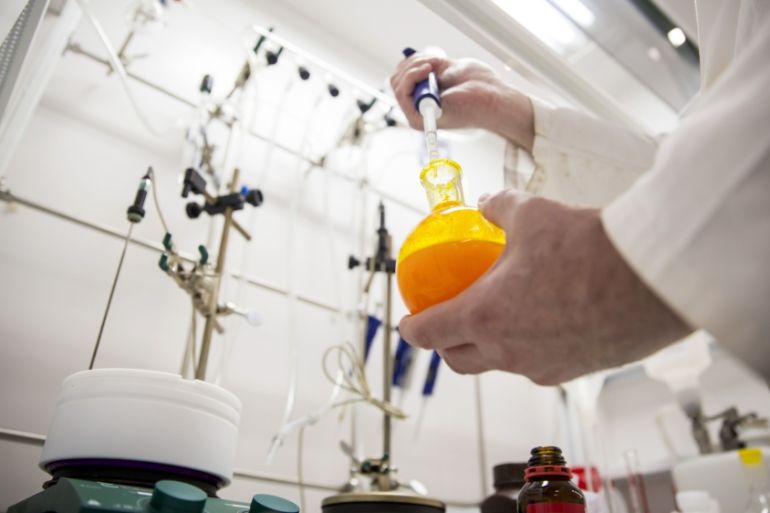GSK aims for 1 billion doses of booster for coronavirus vaccine
The adjuvant could be a critical ingredient in at least seven experimental vaccines against the new coronavirus.

The world’s largest vaccine maker laid out plans on Thursday to produce one billion doses of vaccine efficacy boosters for COVID-19 shots next year, as the race to develop a successful solution to the coronavirus crisis heats up.
GlaxoSmithKline (GSK) said it was in talks with governments to back the manufacturing expansion of the boosters, or adjuvants, that would help to scale up production of future vaccines for COVID-19, the disease caused by the novel coronavirus.
Keep reading
list of 2 itemsUS stocks soar as investors bet on coronavirus vaccine
The adjuvant could be a critical ingredient in at least seven experimental vaccines against the coronavirus currently being developed around the world, including one by Sanofi, with whom GSK signed a collaboration deal in April.
Adjuvants, a key component of the traditional vaccination approach, have been shown to create stronger and longer-lasting immunity against infections and allow for lower dosing of the protein in a vaccine, making way for higher-volume production.
The British drugmaker would not disclose the programme’s costs, saying only that production would take place at sites in Europe and North America and that it would reinvest any profit into coronavirus research and preparation for future pandemics.
The company is one of the many global players working on projects to counter the respiratory illness that currently has no treatment and has killed about 350,000 people.
“We believe that more than one vaccine will be needed to address this global pandemic and we are working with partners around the world to do so,” said GSK Global Vaccines President Roger Connor.
As well as its collaboration with Sanofi, GSK has contributed the adjuvant to alliances involving Chinese biotech firms Clover Biopharmaceuticals and Xiamen Innovax, as well as the University of Queensland, Australia.
GSK shares were up 1.4 percent at 1,671.2 pence by 09:16 GMT.
Booster shot
Experts have predicted that a successful vaccine will take more than a year to develop. Companies and governments are pouring money into dozens of programmes as their best hope of allowing an escape from lockdowns and getting economies expanding again.
While more than 100 vaccine candidates are being trialled, according to the World Health Organization, only 10 have moved to the human testing phase, a stage where they are investigated for safety and efficacy, and at which most vaccines fail.
Other promising vaccine approaches do without adjuvants. These include the use of so-called mRNA, pursued by Moderna and Biontech, where genetic code is injected into the body to instruct human cells to make virus-like proteins that trigger an immune response.
AstraZeneca and Oxford University’s viral vector approach, where harmless viruses instruct human cells to make virus-like proteins, also needs no adjuvants.
The United States last week secured almost a third of the first one billion doses planned for AstraZeneca’s experimental COVID-19 vaccine by pledging up to $1.2bn.
On Thursday, GSK said making its adjuvant available to the world’s poorest countries will be a key part of its efforts.